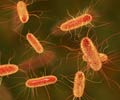At the University at Buffalo, researchers are working on genetically engineering microorganisms to synthesize compounds such as flavonoids as an economical and efficient solution for ageing, cancer and even obesity. They are manipulating E. coli into tiny, cellular factories.
"Ultimately, we want to be able to take a designed E. coli off of the shelf and drop into it the enzymes that constitute a particular biosynthetic pathway in order to make exactly the product we want," said Dr. Mattheos A. G. Koffas, assistant professor of chemical and biological engineering in the School of Engineering and Applied Sciences, and leader of the research team.He said that microbial biosynthesis reduces or eliminates the need for petrochemical sources, elevated temperatures, toxic heavy metal catalysts, extremes of acidity and dangerous solvents through the use of specially adapted bacteria, specialized enzymes and natural feedstock.
The researcher revealed that his team was using can facilitate chemical reactions, which are difficult to accomplish through conventional chemistry such as chiral syntheses.
"We are finding out how we can actually 'train' microbial systems to produce high yields of chemicals to be used as pharmaceuticals and to make production processes more efficient, less expensive and more environmentally friendly," Koffas said.
He revealed that his team had produced 400 milligrams of flavonoids per litre of cell culture, far above the next highest yield of about 20 milligrams per litre produced by other microbial synthesis efforts. It had been reported in Applied and Environmental Microbiology in June, he added.
"We have done this by increasing the amount of precursor available and re-engineering the native microbial metabolism," said Koffas, adding that they had taken different approaches to identifying the pathways that led to the biosynthesis of precursors for desired compounds.
Advertisement
Koffas' lab recently achieved the functional expression in E. coli of P450 monooxygenases, enzymes that are used widely in nature, but are not readily expressed in most industrially important microorganisms.
Advertisement
He said that his team was particularly interested in developing novel molecules that could be used to treat chronic diseases, such as type II diabetes and obesity. He further also revealed that the researchers were using the methods to produce specialty compounds, such as natural pigments, that could replace chemical dyes in food.
Koffas' group is using microbial synthesis strategies for the biosynthesis of other commercially significant classes of compounds, including vitamins, anti-cancer drugs, anti-parasitic drugs, dyes and food supplements.
The researchers hope to achieve pilot scale production of flavonoids by the end of this year.
Source-ANI
GAN/C











